- Home
- Cory Doctorow
The Great Big Beautiful Tomorrow Page 13
The Great Big Beautiful Tomorrow Read online
Page 13
Many of us grow up thinking that we live in a society where governments and corporations more or less behave themselves. But this is so visibly untrue when you go through WikiLeaks! What looks like democracy is really corporations shopping for “the best government that money can buy.” Over and over again, our best interests are set aside and auctioned off. WikiLeaks reveals the ways in which our society is cor-poratist. Maybe not every policy that gets made and maybe not everything is corrupt, but at the end of the day this is the society we live in. This truth is unequivocally powerful.
So on the whole, I think WikiLeaks is generally a force for good. On the other hand, the notion of everything being leaked, everything being leakable, is one we have not yet come to grips with. What happens when it gets personal, not just for the rich and powerful, but for everybody? All the things that are embarrassing or humiliating, all that stuff is just going to start oozing out onto the Internet linked with your name.
So transparency turns into its opposite. An enemy of personal freedom.
It could happen. It could also not happen.
We’ve had telescopes for a long time but we don’t have an epidemic, at least not that I know of, of people using them to spy on their neighbors. There are creepy people who do it, but they’re creepy, right? It didn’t turn into a social norm that if you haven’t put your blinds down you deserve to be peeped. Instead we somehow managed to cling to the idea that you’re a dick if you’re looking through my window.
That’s a morality, an ethic that I hope we can maintain in this surveillance culture. And I do think there’s a major difference between exposing the wrongdoings of governments and elected representatives, and governments and elected representatives spying on us, using technology to control us better. Those aren’t the same thing.
You went to that Singularity Conference back in 2006. What do you think about the Singularity? The idea that at some point (and soon!) our machines will be smarter than we are?
You know what’s funny about that question? I had the first lines of a short story this morning that I tweeted because I didn’t know what else to do with it. Let me see if I can find it. It was a very “Bears Discover Fire” first line, if I do say so myself. Here it is:
“Honey, the Singularity is at the door. He says everything is different now.”
“Tell him we don’t want anything now.”
“He’s very insistent.”
I love it. What happens next?
That’s the problem, isn’t it? I think the Singularity is a literary device (and also a spiritual belief system) that naturally arises from people who try to imagine a world in which everything gets better and, at the same time, run up against the limits of their imagination in trying to imagine a boundary condition for progress.
What happens when you reach the end of progress?
Well the end of progress, when it all bursts, is the Singularity. Predicting it is one thing, describing it another. It’s like when our species developed a theory of mind. I think that someone who has a theory of mind and someone who doesn’t probably don’t have much to say to each other. But we’re trying. Charlie Stross and I are writing a book right now called The Rapture of the Nerds. We stole the title from Ken MacLeod.
I hope I’ll still be able to read it when it comes out. Do you go to lots of SF conventions?
I always go to WorldCon. But the con thing is fading, empirically. The numbers are down at almost every con, and the fans who go are getting older. I was a con-going baby fan. When I was fifteen I volunteered at the local convention and slept in the gopher hole, and that was my entre to SF fandom. That was Ad Astra in Toronto, and when I was going, there were like two thousand people, and now there’s four or five hundred, and the younger people who are turning up are basically my generation; there’s no one behind us. In contrast, the gaming and anime conventions are so orgasmically huge! The interesting thing about them is that almost without exception they were founded by con-going SF fans.
ComicCon, the huge San Diego comics gathering, was started by people like you and me. We would recognize them instantly as part of the tribe. They hit 275,000 before the San Diego fire marshal made them limit memberships. So cons are running, but not our kind of cons. Not the traditional science fiction fan con.
Why do you think that is?
My Tor editor, Patrick Nielsen Hayden, who knows more about this stuff than I ever will, traces the decline back to a conscious decision to exclude a certain kind of celebrity and commerciality from SF cons. In the 1980s, everyone was worried about the Star Trek conventions turning into a kind of velvet-rope deal, with the guests emerging from the green room to see the public, then retreating back into it. And there’d be the good party and the bad party, and you can see why SF, being the literature of outcasts, rejected that. You wouldn’t want your thing where everyone belonged to turn into a thing where once again you were sitting at the uncool kids’ table.
What happened was that the cons that were run by fans who were willing to integrate a little of that glitzy stuff, like the ComicCon founders, just kind of took off; and the cons that stayed the way they were, didn’t.
You went from fan to pro pretty quick, with Down and Out in the Magic Kingdom. I know you went to Clarion, the famous SF workshop. Do you still workshop stuff pass it by others before it’s published?
I don’t workshop anymore, because I travel too much. I miss it. When my daughter gets a little older, I’m going to go back to my summer workshop, the one we do in Toronto every year. Some of us went to Clarion together, others just got invited in because we knew their work and taste. You bring a story and you write a story and you workshop them all. You learn to look at your work through the eyes of others.
I really like the process but I can’t do the week-long workshops. I have too many projects going at once.
Sounds like a good problem to have. How do you keep up with it all?
I set a word target and I just hit it everyday. When I hit that word target I stop. Period. I stop in the middle of a sentence, so I can start the next day without having to think of anything. I don’t remember who told me that trick, but I swear to God if there was just one thing I could teach other writers, it would be that.
Wasn’t it Hemingway who said that if you stop in the middle, you always start up easy.
Might have been Hemingway. I wouldn’t be surprised if it were a Babylonian scribe. Its one of those things that,
once you learn it, just feels right. But until you do it, it seems crazy.
What if there were two things?
If there were two things I could teach people, the second would be to write every day. It’s the one thing I wish I’d started doing ten years earlier. I always thought, “Every damn day? What are you talking about? I have to lure the muse into the room, how can I write every day?”
But writing every day was transformative. Now it’s at the top of my to-do list. I sit down. I put my bum in my chair and I write. When I’m super, super busy or traveling, my target might be as little as 200—250 words a day, which is peanuts. I type 70—80 words a minute. I’ve got twenty-four hours to think about what those words are going to be. I can write them. So I do.
That was Trollope’s method.
So, you see?
How do you keep the plot in mind?
Usually I work from a treatment instead of a plot outline. I know the kind of things that are going to happen, and maybe a few set pieces, but I don’t always know how to get from A to B. My rule of thumb, my heuristic for getting from A to B, is to use what I call The Lake. I always try to have the character trying and failing to solve his (or her) problem and for the problems to always be getting worse. It’s an Algis Budrys (the SF writer) type of thing. So long as the attempts to solve the problem are intelligent, there’s always a reason to turn the page. Because you want to see people who are intelligent trying to solve problems and you can’t look away when they’re failing and things are getting worse. I think that�
��s almost a pocket definition of dramatic tension.
What the hell does that have to do with a lake?
I grew up in Toronto, which is in a lake basin. The lake is south, so downhill is always south. You can’t get lost. Wherever there’s a junction, if you just go downhill eventually you get to the lake. And if you just make things get worse for your characters, eventually you get to the end. They solve the problem and the novel ends. There are probably more compact ways of getting there, but you can always get there if things are always getting worse. So you can always get to the lake, if that’s where you’re trying to go.
Back to Boing Boing. You cover an awfully wide and wonderfully eclectic variety of stuff. How do you decide what to keep up with? (Not to mention, how do you do it?)
With a little help from my friends. As a culture, we have gone from a deterministic method of consumption of media to a probabilistic one.
For example, the old SF fans still talk about how you could read the whole field, back in the day. You could read every novel, every magazine, and if you missed something, someone would tell you about it. Deterministic.
Now what happens is that I can’t even read all my RSS feeds or e-mails or tweets, much less the novels or events they are about. But the good stuff bubbles up anyway because of reblogging, retweeting, whatever you want to call it. That’s what I mean by probabilistic.
Some folks—like the people at the New York Times or the Advertising Age resident curmudgeon, or that guy at the Columbia School of Journalism who hates my guts—dismiss retweeting, reblogging and such as “parasitic.” They don’t get it. It is the only way we can have an adequate navigational apparatus for negotiating the sheer volume of material available to us. Without it, there would be no movement from inside your first orbit of social and cultural contacts, no line to the millions who know a million others from a million different walks of life, the cross-pollinators who gets a little bit of information from here and send it there, and connect us all. Without them, the conversation would die. These are the people who are essentially making sure that whatever is locally good for you bubbles up to the top of your pile. They are as important to the future fecundity of media as bees are to the future fecundity of plants.
There is one question I ask everybody. What kind of car do you drive?
I’ve only owned one car in my life. I owned it for one year, the year I lived in Los Angeles. It was a Hyundai Elantra. A friend who is a car geek told me: “Find a car that’s never been in a wreck, that’s below its bluebook, and then sell it at the end of the year. It’ll be cheaper than leasing.” And he was right, I sold it for exactly what I paid it. I covered everything in it in sheepskin as an experiment. Sheepskin steering wheel cover, sheepskin seat covers, and it was like it just oozed lanolin everywhere. I got a horn that played “Low Rider.” So that was LA. Now I have an RFID key that gets me a short-hire bicycle. They’re all over London, and that’s how I get around.
So, back to my original question. When you look in the mirror these days, who looks back? A science fiction writer, a journalist, a teacher, a blogger, an activist?
Depends on the day, or maybe the time of day. I don’t spend a lot of time looking in the mirror. I don’t sweat that stuff anymore. It reminds me of when we were all generic subculture kids trying on identities. Are you a cow punk? Are you a crusty punk? A hardcore punk? A straight-edge punk? Worrying about what niche you’re in is a little too much like high school.
Let’s just say you’re a Cory Doctorow sort of guy.
BIBLIOGRAPHY
NOVELS
Down and Out in the Magic Kingdom (Tor, 2003)
Eastern Standard Tribe (Tor, 2004)
Someone Comes to Town, Someone Leaves Town (Tor, 2005)
Little Brother (Tor Teens, 2008)
Makers (Tor, 2009)
For the Win (Tor Teens, 2010)
Pirate Cinema (Tor Teens, 2012)
Rapture of the Nerds (with Charles Stross) (Tor, 2012)
GRAPHIC NOVELS
Cory Doctorow’s Futuristic Tales of the Here and Now (IDW, 2008)
Anda’s Game (FirstSecond, 2012)
NONFICTION
The Complete Idiot’s Guide to Publishing Science Fiction (with Karl Schroeder) (Alpha, 2000)
Content (Tachyon, 2008)
Context (Tachyon, 2011)
COLLECTIONS
A Place So Foreign and Eight More (Four Walls Eight Windows, 2003)
Overclocked (Thunder’s Mouth, 2007)
With a Little Help (Sweet Home Grindstone, 2010)
ABOUT THE AUTHOR
CORY DOCTOROW (CRAPHOUND.COM) IS A science fiction novelist, blogger, and technology activist. He is the co-editor of the popular blog Boing Boing (boingboing.net), and a contributor to the Guardian, the New York Times, Publishers Weekly, Wired, and many other newspapers, magazines, and websites.
He was formerly Director of European Affairs for the Electronic Frontier Foundation (eff.org), a nonprofit civil liberties group that defends freedom in technology law, policy, standards and treaties. He is a visiting senior lecturer at Open University (UK) and scholar in virtual residence at the University of Waterloo (Canada). In 2007, he served as the Fulbright Chair at the Annenberg Center for Public Diplomacy at the University of Southern California.
In 2008, he became a father. His daughter, Poesy Emmeline Fibonacci Nautilus Taylor Doctorow is a marvel that puts all the works of technology and artifice to shame.
PM PRESS OUTSPOKEN AUTHORS
The Left Left Behind
Terry Bisson
978-1-60486-086-3
$12
Hugo and Nebula award-winner Terry Bisson is best known for his short stories, which range from the southern sweetness of “Bears Discover Fire” to the alienated aliens of “They’re Made out of Meat.” He is also a 1960s’ New Left vet with a history of activism and an intact (if battered) radical ideology.
The Left Behind novels (about the so-called “Rapture” in which all the born-agains ascend straight to heaven) are among the bestselling Christian books in the US, describing in lurid detail the adventures of those “left behind” to battle the Anti-Christ. Put Bisson and the Born-Agains together, and what do you get? The Left Left Behind—a sardonic, merciless, tasteless, take-no-prisoners satire of the entire apocalyptic enterprise that spares no one-predatory preachers, goth lingerie, Pacifica radio, Indian casinos, gangsta rap, and even “art cars” at Burning Man.
Plus: “Special Relativity,” a one-act drama that answers the question: When Albert Einstein, Paul Robeson, J. Edgar Hoover are raised from the dead at an anti-Bush rally, which one wears the dress? As with all Outspoken Author books, there is a deep interview and autobiography: at length, in-depth, no-holds-barred and all-bets off: an extended tour though the mind and work, the history and politics of our Outspoken Author. Surprises are promised.
PM PRESS OUTSPOKEN AUTHORS
The Lucky Strike
Kim Stanley Robinson
978-1-60486-085-6
$12
Combining dazzling speculation with a profoundly humanist vision, Kim Stanley Robinson is known as not only the most literary but also the most progressive (read “radical”) of today’s top-rank SF authors. His best-selling Mars Trilogy tells the epic story of the future colonization of the red planet, and the revolution that inevitably follows. His latest novel, Galileo’s Dream, is a stunning combination of historical drama and far-flung space opera, in which the ten dimensions of the universe itself are rewoven to ensnare history’s most notorious torturers.
The Lucky Strike, the classic and controversial story Robinson has chosen for PM’s new Outspoken Authors series, begins on a lonely Pacific island, where a crew of untested men are about to take off in an untried aircraft with a deadly payload that will change our world forever. Until something goes wonderfully wrong.
Plus: A Sensitive Dependence on Initial Conditions, in which Robinson dramatically deconstructs “alternate history” to explo
re what might have been if things had gone differently over Hiroshima that day.
As with all Outspoken Author books, there is a deep interview and autobiography: at length, in-depth, no-holds-barred and all-bets-off: an extended tour though the mind and work, the history and politics of our Outspoken Author. Surprises are promised.
PM PRESS OUTSPOKEN AUTHORS
Mammoths of the Great Plains
Eleanor Arnason
978-1-60486-075-7
$12
When President Thomas Jefferson sent Lewis and Clark to explore the West, he told them to look especially for mammoths. Jefferson had seen bones and tusks of the great beasts in Virginia, and he suspected—he hoped!— that they might still roam the Great Plains. In Eleanor Arnason’s imaginative alternate history, they do: shaggy herds thunder over the grasslands, living symbols of the oncoming struggle between the Native peoples and the European invaders. And in an unforgettable saga that soars from the badlands of the Dakotas to the icy wastes of Siberia, from the Russian Revolution to the AIM protests of the 1960s, Arnason tells of a modern woman’s struggle to use the weapons of DNA science to fulfill the ancient promises of her Lakota heritage.
Plus: “Writing SF During World War III,” and an Outspoken Interview that takes you straight into the heart and mind of one of today’s edgiest and most uncompromising speculative authors.
Praise:
“Eleanor Arnason nudges both human and natural history around so gently in this tale that you hardly know you’re not in the world-as-we-know-it until you’re quite at home in a North Dakota where you’ve never been before, listening to your grandmother tell you the world.” —Ursula K. Le Guin

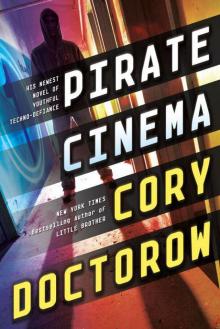 Pirate Cinema
Pirate Cinema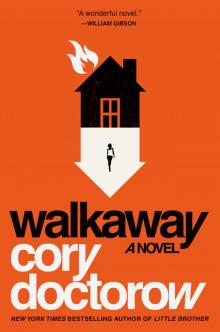 Walkaway
Walkaway Little Brother
Little Brother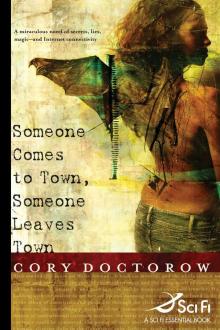 Someone Comes to Town, Someone Leaves Town
Someone Comes to Town, Someone Leaves Town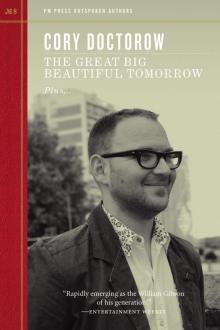 The Great Big Beautiful Tomorrow
The Great Big Beautiful Tomorrow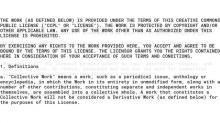 Super Man and the Bug Out
Super Man and the Bug Out For the Win
For the Win A Place so Foreign
A Place so Foreign Shadow of the Mothaship
Shadow of the Mothaship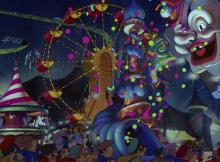 Return to Pleasure Island
Return to Pleasure Island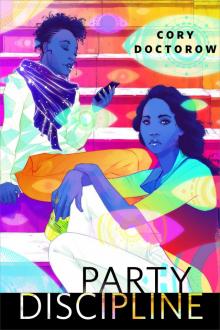 Party Discipline
Party Discipline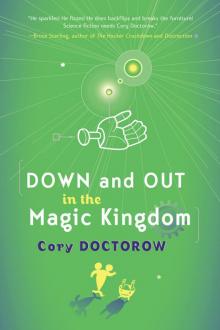 Down and Out in the Magic Kingdom
Down and Out in the Magic Kingdom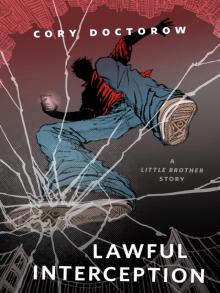 Lawful Interception
Lawful Interception Homeland
Homeland Eastern Standard Tribe
Eastern Standard Tribe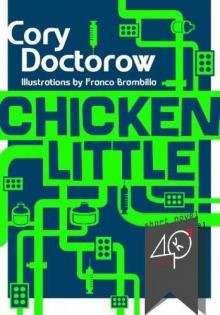 Chicken Little
Chicken Little I, Row-Boat
I, Row-Boat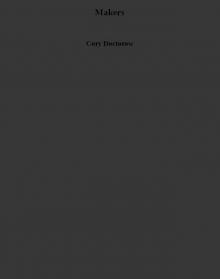 Makers
Makers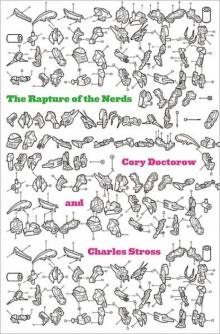 Rapture of the Nerds
Rapture of the Nerds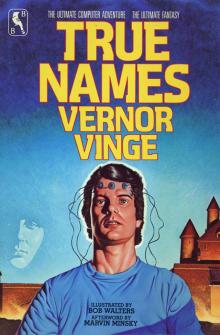 True Names
True Names